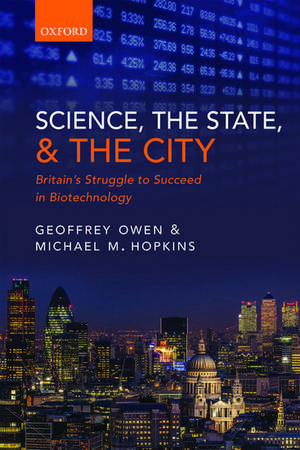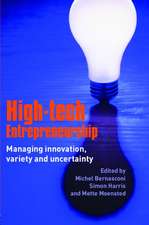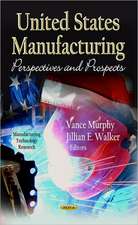Science, the State and the City: Britain's Struggle to Succeed in Biotechnology
Autor Geoffrey Owen, Michael M. Hopkinsen Limba Engleză Hardback – 14 apr 2016
Preț: 395.72 lei
Preț vechi: 519.57 lei
-24% Nou
Puncte Express: 594
Preț estimativ în valută:
75.72€ • 78.90$ • 62.70£
75.72€ • 78.90$ • 62.70£
Carte disponibilă
Livrare economică 03-08 martie
Preluare comenzi: 021 569.72.76
Specificații
ISBN-13: 9780198728009
ISBN-10: 019872800X
Pagini: 272
Dimensiuni: 162 x 240 x 21 mm
Greutate: 0.53 kg
Editura: OUP OXFORD
Colecția OUP Oxford
Locul publicării:Oxford, United Kingdom
ISBN-10: 019872800X
Pagini: 272
Dimensiuni: 162 x 240 x 21 mm
Greutate: 0.53 kg
Editura: OUP OXFORD
Colecția OUP Oxford
Locul publicării:Oxford, United Kingdom
Recenzii
It is remarkable just how little realistic auditing there has been of the success or otherwise of British innovation policy over the past 40 years. This book offers the richest analysis we have of British research policy for any particular area, indeed the one in which the most hope was invested.
The authors provide a much needed and invaluable insight into the emergence of the global biotech industry, challenging the UKs failure to emulate the USAs success. Public policy failings and the inadequacies of the entrepreneurial ecosystem are laid bare, yet the final conclusion is that the US appetite for innovative products combined with the depth of its markets has fuelled its competitive advantage.
This is an authoritative and comprehensive guide to the development of the biotech industry. The comparison between the US and the UK provides an illuminating case study in innovation policy. Its judgements are shrewd and well-informed and I welcome this important book.
Science, the State, and the City is a wonderful exploration of why Europes biotech sector has lagged behind the US. Through a detailed historical analysis of the history of the UK biotech sector, this book teaches us about how the combination of technological, market, and institutional forces shape international competitive advantage. This book provides important insights about the role of public policy in technology-based industries in general.
As a long-term investor in the UK biotech sector, and with the scars to prove it, I warmly endorse this informative and timely study. It successfully highlights the great achievements by our scientists on the one hand, with an oft recurring tale of financial tragedy, under-delivery or disappointment, on the other. I am convinced the UK continues to have much to offer the world in this critical field and this work clearly demonstrates that a new culture of co-operation between science and business needs to be rapidly developed.
At one level, the book by Owen and Hopkins provides a detailed history of the evolution of the industry in the US and the UK, the two countries which have been the most successful. The technical science behind the products is set out succinctly, and the authors chart a clear course in describing the main firms over the decades, what happened to them, where they stand now, and how they obtained their finance. It is a very good source for anyone wishing to learn about this important industry. But the main thrust of the book is analytical rather than descriptive. The aims of the authors are to explain how firms based in the US took the lead in commercialising the scientific advances, and why it has been so difficult for companies in other advanced economies to displace the Americans from their dominant position. Overall, this book is very well written and researched, and contains many interesting ideas. A very good buy.
The authors provide a much needed and invaluable insight into the emergence of the global biotech industry, challenging the UKs failure to emulate the USAs success. Public policy failings and the inadequacies of the entrepreneurial ecosystem are laid bare, yet the final conclusion is that the US appetite for innovative products combined with the depth of its markets has fuelled its competitive advantage.
This is an authoritative and comprehensive guide to the development of the biotech industry. The comparison between the US and the UK provides an illuminating case study in innovation policy. Its judgements are shrewd and well-informed and I welcome this important book.
Science, the State, and the City is a wonderful exploration of why Europes biotech sector has lagged behind the US. Through a detailed historical analysis of the history of the UK biotech sector, this book teaches us about how the combination of technological, market, and institutional forces shape international competitive advantage. This book provides important insights about the role of public policy in technology-based industries in general.
As a long-term investor in the UK biotech sector, and with the scars to prove it, I warmly endorse this informative and timely study. It successfully highlights the great achievements by our scientists on the one hand, with an oft recurring tale of financial tragedy, under-delivery or disappointment, on the other. I am convinced the UK continues to have much to offer the world in this critical field and this work clearly demonstrates that a new culture of co-operation between science and business needs to be rapidly developed.
At one level, the book by Owen and Hopkins provides a detailed history of the evolution of the industry in the US and the UK, the two countries which have been the most successful. The technical science behind the products is set out succinctly, and the authors chart a clear course in describing the main firms over the decades, what happened to them, where they stand now, and how they obtained their finance. It is a very good source for anyone wishing to learn about this important industry. But the main thrust of the book is analytical rather than descriptive. The aims of the authors are to explain how firms based in the US took the lead in commercialising the scientific advances, and why it has been so difficult for companies in other advanced economies to displace the Americans from their dominant position. Overall, this book is very well written and researched, and contains many interesting ideas. A very good buy.
Notă biografică
Sir Geoffrey Owen was educated at Rugby and Balliol College, Oxford, and spent most of his career at the Financial Times, serving as industrial editor, US correspondent based in New York, deputy editor (1973-1980) editor (1980-1990) - also spent two years with the Industrial Reorganisation Corporation and three with British Leyland. He joined the LSE in 1990, served as visiting fellow in the Department of Management until 2013, teaching in the field of corporate strategy and international competition. Books include From Empire to Europe: the decline and revival of British industry since the Second Word War (HarperCollins 1999).) The rise and fall of great companies: Courtaulds and the reshaping of the man-made fibres industry (OUP 2010).Michael M. Hopkins is a Senior Lecturer and Director of Research for the Science Policy Research Unit (SPRU) at the University of Sussex. After studying Biology at Sussex, he worked in the biotechnology industry as a sales and marketing manager, selling reagents for research. He joined SPRU as a research assistant in 1997, later completing his doctoral training in Science and Technology Policy Studies. His research focuses on policies and strategies for biomedical innovation. Previous publications include A Biotechnology Managers Handbook (Woodhead Publishing 2012).









